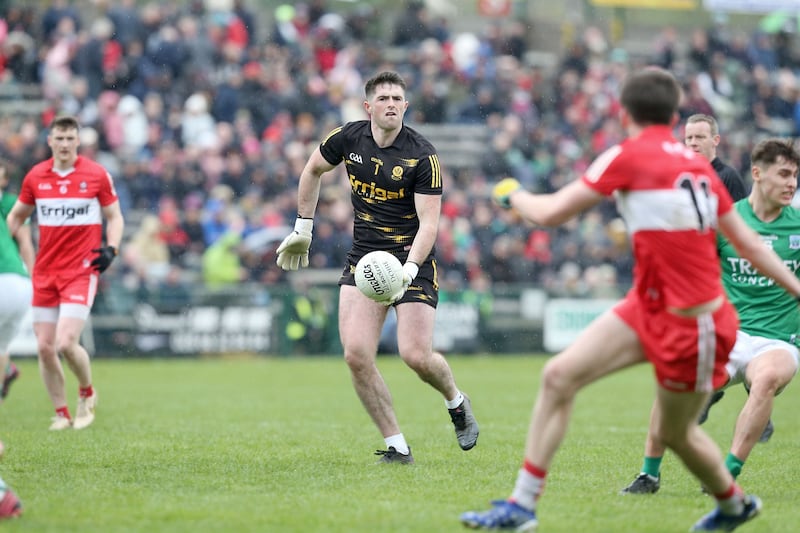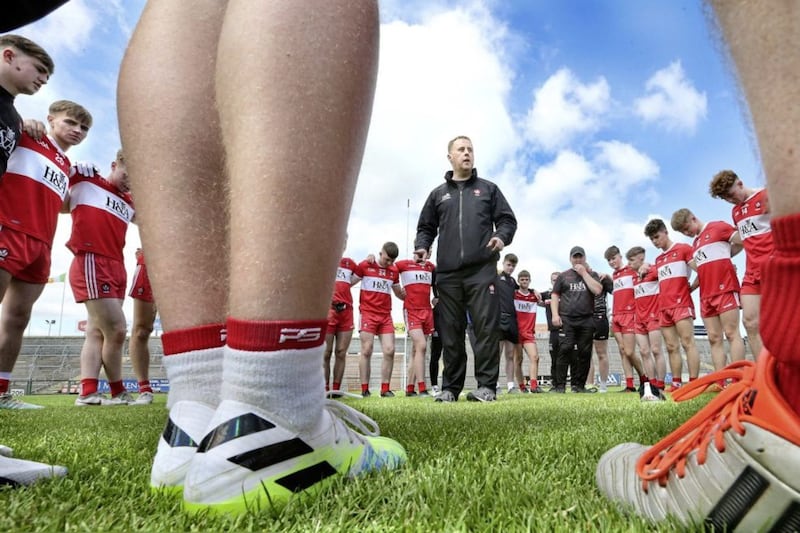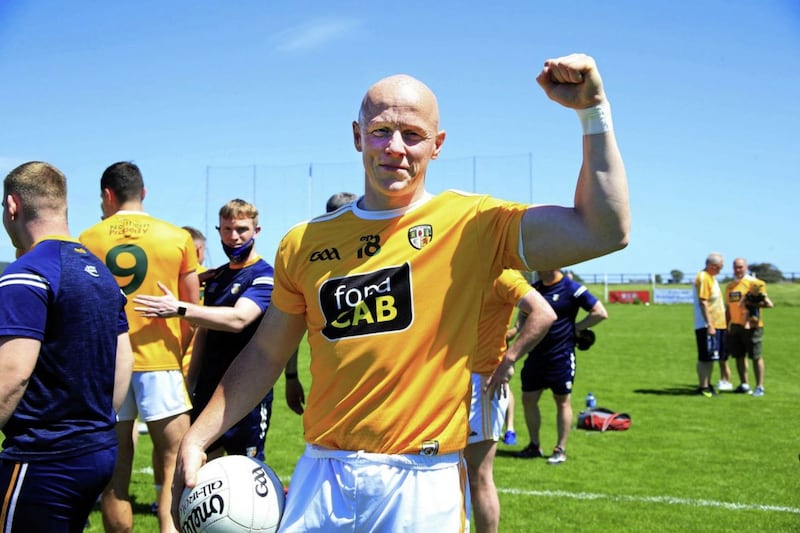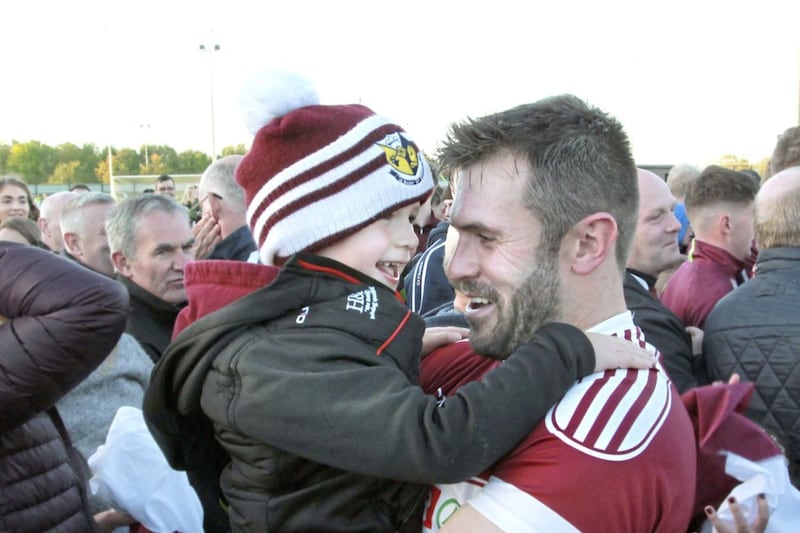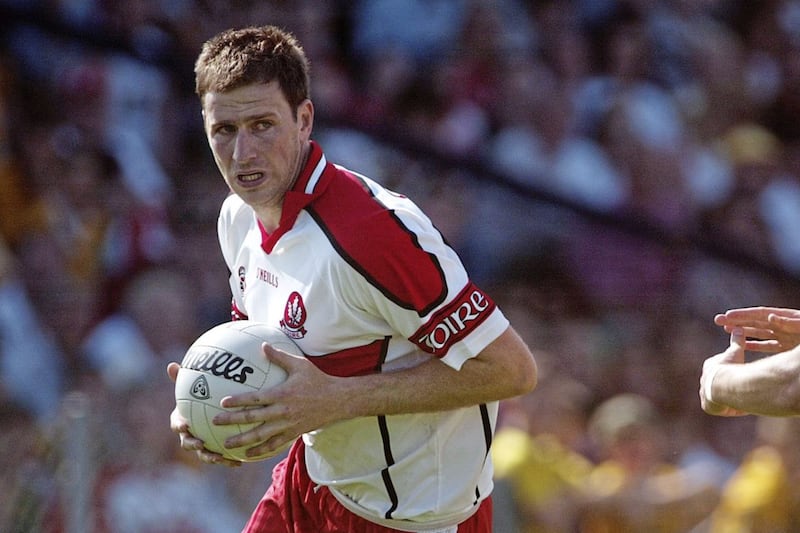IF Mark Lynch had a trademark, it was his unique and uncanny ability to kick points from the wrong side.
Were someone to produce a heat map of his 15 years in Derry colours, the deepest red would be down the right wing, 40 yards from goal.
When he got the ball in that position, it was look, aim, fire. All of it in a blink.
And you never doubted him from there. Not once. Not ever.
But the red on the heatmap would look a pale shade of pink compared to what would run from his arteries if you cut him.
There have been greater players in Derry’s history, though very few.
He is in the echelons with Downey, Tohill, McKeevers Kieran and Jim, his own clubmate Sean Marty Lockhart, et al.
Yet you’d struggle to find one of them that offered more when rewards, or even their prospect, were so lean.
The example he led by on the pitch was matched off it.
There was no bigger Derry man than Mark Lynch but in an era where the dedication of inter-county players to their clubs can often be questioned, it could never have been levelled at him.
In Derry, county players get 11, 12, 13 club league games most years.
But so fiercely is the club game protected that the one or two exceptions always caused men to waver.
Never him. The rules weren’t always to be loved, but they were to be respected.
And if it was 13 games he’d be allowed to play for Banagher, you can be absolutely sure he’d play the 13 of them.
He’d hurl a small bit too, and was a young championship winner from 2005 when they snatched it off their old Dungiven rivals Kevin Lynch’s with a last-minute goal.
There were other near misses in his equally beloved maroon, not least when he was the best player by a mile in the 2012 championship. His uncle Eamon played him at midfield alongside PJ McCloskey and together with Paul Cartin, they almost drove a famous success, pipped by a point by Ballinderry in an epic semi-final.
The image of him celebrating the club’s Derry intermediate success this autumn with his eldest son, Paudie, is one he will treasure.
Now with a second son and a job that demands 5.30am starts, life has caught up.
“Playing for Derry was something I always enjoyed and it breaks my heart to think I won’t do it again,” he said in the statement announcing his retirement.
It wasn’t unexpected but the finality of it leaves Derry with a huge deficit of experience as they look to climb back out of Division Four.
It will genuinely have broken his heart to know that, but there’s only so long that it can be his problem to fix.
He had the humility to accept a role of coming in off the bench most weeks in 2018, to carry on doing as much as he could to bring the young players along.
Recognising that his presence at Owenbeg during the week was vital to the team’s development, even if the weekends were frustrating.
Nobody gave more.
If justice were served, he would have won an Allstar in 2014.
Flynn, Murphy, Connolly. O’Connor, Donaghy, O’Donoghue. It’s a quare decent forward line.
But Lynch was the equal and more of any of them that year.
He was in the physical condition of his life, which helped.
But equally crucial was that Brian McIver gave him a home in the team.
If Mark Lynch ever fell short then the blame for that ought to have lay with the men who passed him from door to door for more than a decade.
Midfield, wing-forward, centre-forward, full-forward, he played everywhere and nowhere. He was so good in so many positions that nobody could settle on what best to do with him.
The school of thought among Derry supporters was that he should always have been centre-back.
When he played there he was excellent, but it was too seldom.
But it was in the number 11 role that he peaked in 2014.
Derry played outstanding football that year to reach a National League final. Lynch was the very hub of it.
The black card had just been introduced. Football was, for the opening three months of the year, almost a glorious man-to-man pursuit.
No defence could cope with him. He’d pick the ball up and use his strength to get goalside of the centre-back.
Barring let him go, the only thing defenders could have done was foul him.
His 1-8 against Dublin when Derry beat them (imagine that, just shy of five years ago) was ludicrous.
The same for his semi-final performance against Mayo in Croke Park, when Derry won with 14 men.
Those were the days.
They were few and far between in Lynch’s career.
Beyond winning a National League in 2008, rattling home the opener at the near post against Armagh in 2011 to take Derry to the one Ulster final they played in his time stands out as a high point for the teams he played on.
There were too many short summers, just like 2014.
And yet even within it, his performance against Longford was heroic.
Derry looked dead until he picked up the ball, beat three men and buried it into the top corner from 20 yards.
That levelled it, and then they got caught on the break and beaten all over again.
Mark Lynch was destined to have one of the great summers but perhaps it summed it all up best.
Between pushing eventual All-Ireland finalists Donegal to the wire and losing to Longford a few weeks later, Derry turned over two-thirds of their team.
That’s somehow become nothing remarkable.
The revolving door has hit over 100 asses on their way out in the last decade alone.
One man always remained. Mark Lynch would’ve swam seas, he would have climbed mountains, he would have crawled through hells to play for Derry.
He often did, and he did it across a time where it was so easy to leave.
That’s the mark of a true Derry man.
That’s the mark of Mark Lynch.


